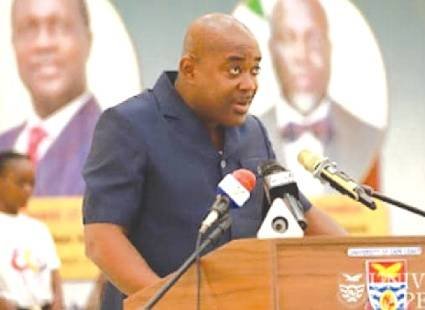
A number of distressed private tertiary educational institutions in the country will be forced to shut down after failing to meet certain key requirement, the acting Director General of the Ghana Tertiary Education Commission (GTEC), Prof Ahmed Jinapor has said.
He explained that, per the GTEC Act, 2023, all private tertiary educational institutions were to Charter or demonstrate evidence or processes towards the attainment of same by August 31, 2024 before they stay in business.
Prof Jinapor said this at the opening of the 9th Association of West African Universities Conference being held in Cape Coast, the Central Regional capital.
The three-day conference being attended by academics from universities across the West African Sub-region is on the theme, “Promoting quality tertiary education in West Africa through collaboration, regional integration and technology.”
Prof Jinapor indicated that, the country (Ghana) had 310 tertiary education institutions in the database of GTEC and out of the number, 128 were private tertiary institutions and the rest public.
The Commission, he said, had received 77 applications from private university on their determination to Charter with 43 ready to charter, 21 readiness to charter within two years and some in distress conditions, and being recommended to shut down.
He, therefore, called on all stakeholders within the private tertiary education sector to take the exercise seriously since non-adherent institutions would be forced to close upon the window of expiration as captured in the law.
According to Prof Jinapor, accreditation was a basic requirement for quality assurance and it guaranteed adherence to the tenets, norms and practices.
The Commission, he said, had the belief that, collaboration, regional integration and technology could be properly situated within the spectrum of quality tertiary education.
The current leadership of GTEC, he explained, was to determine in positioning tertiary education delivery in the country as a game changer in the foreign resource mobilization in the Ghanaian economy within the shortest possible time.
Promoting tertiary education in the West African sub-region, he said, required a concerted efforts from all stakeholders and added that the programme was an excellent addition in the realization of the objective.
The Vice-Chancellor of the University of Cape Coast (UCC), Prof Johnson Nyarko Boampong, underscored the critical role of quality higher education to the development of countries.
He indicated collaboration and strategic networking were not only imperative but crucial in a fast-pace world, saying, “The world has become a global village with increasing globalization, no individual or institution can achieve things alone”.
He called on universities in the sub-region to strengthen their regional bonds, saying, “The bonds that hold us together rather than the ones that divide us”.
The time for integration in the continent, he said, was crucial because the time had come for Africa to put its destiny into its own hands and move away from the “dependency syndrome” of relying on foreign support.
FROM DAVID O. YARBOI-TETTEH, CAPE COAST







